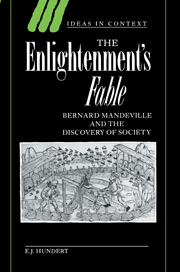Book contents
3 - Performance principles of the public sphere
Published online by Cambridge University Press: 23 November 2009
Summary
Rousseau portrayed the antique ideals of frugality, civic virtue and martial independence as the only morally sound and therefore politically defensible alternatives to the vision of modernity he found in The Fable of the Bees. The corruption of contemporary commercial societies, Rousseau argued, followed inexorably from their illegitimate political foundations, a passage Mandeville had sketched with a perverse glee, and one to which Rousseau compulsively returned. The Fable haunted Rousseau's moral imagination, rendering him oblivious to Mandeville's satiric purposes. Rousseau simply passed over in contemptuous silence Mandeville's frequent assertions that the forms of commercial sociability were at the same time foundations of politically enlightened polities which respected the rights of their citizens, and which more than any others in recorded history provided expanding opportunities for an individual's worldly happiness. Rousseau became one of Mandeville's most influential readers precisely because he could so creatively accept, isolate from their ironic context, and then magnify those features of The Fable's argument in which it was baldly asserted that “What we call Evil in this World … is the grand Principle that makes us sociable Creatures” (1, 369).
In his attack on Mandeville, Rousseau chose to ignore one of The Fable's most sociologically astute insights.
- Type
- Chapter
- Information
- The Enlightenment's FableBernard Mandeville and the Discovery of Society, pp. 116 - 174Publisher: Cambridge University PressPrint publication year: 1994

